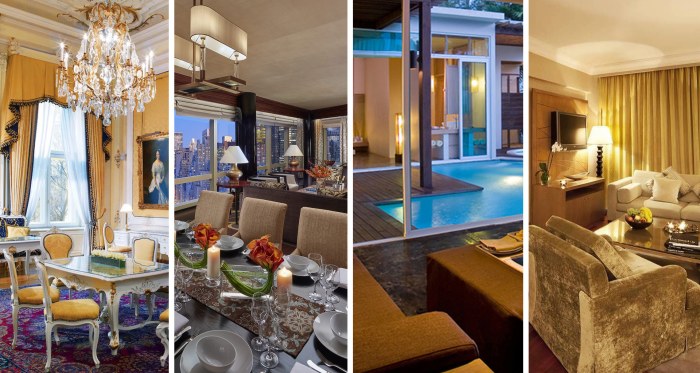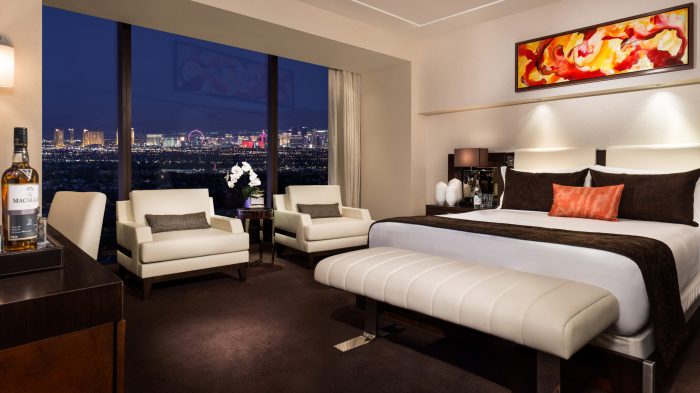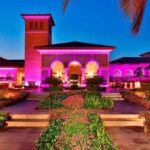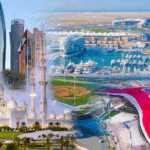Luxury Hotel Suites represent the pinnacle of hospitality, offering an experience far beyond a standard hotel room. These havens of comfort and opulence cater to discerning travelers seeking unparalleled service and amenities. From spacious layouts and lavish décor to personalized services and exclusive access, luxury suites redefine the travel experience, transforming a stay into a memorable journey.
This guide delves into the multifaceted world of luxury hotel suites, exploring everything from their defining characteristics and target audience to pricing strategies, design aesthetics, and the crucial role of technology and sustainability. We’ll examine the key features that differentiate luxury suites from standard accommodations, analyzing the various types of suites available and the factors that contribute to their high cost.
We’ll also investigate how luxury hotels market and brand their suites to attract a discerning clientele, and discuss the competitive landscape and the future of this exclusive segment of the hospitality industry.
Defining Luxury Hotel Suites
Luxury hotel suites represent the pinnacle of hospitality, offering an elevated experience that transcends the typical hotel stay. They are characterized not only by their spaciousness and opulent amenities but also by the curated service and overall ambiance designed to create a memorable and indulgent experience for the guest. This definition encompasses a broad range of accommodations, each catering to different needs and preferences.Luxury hotel suites are distinguished from standard hotel rooms primarily by their size, the quality and quantity of amenities provided, and the level of personalized service offered.
While a standard room provides basic accommodations, a luxury suite provides a significantly more expansive and luxurious living space, often incorporating separate living and sleeping areas, larger bathrooms with high-end fixtures, and a range of exclusive services. The difference is not merely quantitative but qualitative, reflecting a commitment to providing an unparalleled level of comfort and convenience.
Types of Luxury Hotel Suites
Luxury hotel suites come in various forms, each offering a unique set of features and benefits. The categorization often reflects the size, location, and specific amenities offered. Understanding these distinctions helps guests choose the accommodation best suited to their needs.Presidential suites, for instance, represent the most opulent and prestigious accommodations within a hotel. They are typically the largest suites, boasting expansive living spaces, multiple bedrooms and bathrooms, private terraces or balconies with stunning views, and a dedicated staff providing personalized service.
These suites often include bespoke features reflecting the hotel’s unique character and location. Penthouse suites, on the other hand, are usually located on the top floors of the building and offer unparalleled views, often featuring similar luxurious amenities to presidential suites but with a distinct emphasis on panoramic vistas and exclusive access to rooftop amenities. Family suites prioritize spaciousness and functionality for families, often including multiple bedrooms, connecting rooms, and family-friendly amenities like dedicated play areas or kitchenettes.
The key difference between these suite types lies in their intended clientele and the specific emphasis on certain features, be it ultimate luxury and prestige, stunning views, or family-friendly convenience.
Key Features Distinguishing Luxury Hotel Suites from Standard Hotel Rooms
Several key features differentiate luxury hotel suites from standard hotel rooms. Beyond the obvious size difference, the quality of amenities plays a crucial role. Luxury suites often feature high-end furnishings, premium bedding, state-of-the-art technology (such as large smart TVs, high-speed internet, and advanced sound systems), and lavish bathrooms with soaking tubs, rainfall showers, and designer toiletries. Furthermore, the level of personalized service sets luxury suites apart.
Guests often enjoy dedicated concierge services, personalized check-in and check-out experiences, and access to exclusive hotel amenities such as private dining, spa treatments, and transportation services. These elements combine to create an experience that goes beyond simply providing accommodation; it is about curating an unforgettable and personalized stay. The attention to detail, from the selection of linens to the personalized service provided, is a hallmark of a true luxury hotel suite.
Target Audience & Demographics: Luxury Hotel Suites
Luxury hotel suites cater to a discerning clientele with specific needs and expectations. Understanding this target audience is crucial for effectively marketing and managing these high-end accommodations. Their demographic profile is characterized by affluence, a preference for exceptional service, and a desire for unique and memorable experiences.The primary target audience for luxury hotel suites comprises high-net-worth individuals and families, corporate executives, and discerning travelers seeking unparalleled comfort and personalized service.
These guests are often well-traveled and have a sophisticated understanding of luxury goods and services. Their decision-making process is influenced by factors beyond just price, encompassing reputation, exclusivity, and the overall guest experience.
Demographic Characteristics of Luxury Hotel Suite Guests
Luxury hotel suite guests typically exhibit several key demographic characteristics. They are predominantly aged 35-65, with a significant portion falling within the 45-55 age bracket. This group often represents established professionals, entrepreneurs, and senior executives with considerable disposable income. A substantial percentage are couples traveling for leisure or romantic getaways, while others are families seeking premium accommodations for multi-generational trips.
A notable segment also includes high-profile individuals and celebrities requiring enhanced privacy and security. Many are repeat guests at luxury hotels, demonstrating brand loyalty built on consistent positive experiences.
Motivations and Expectations of Luxury Hotel Suite Guests
The motivations and expectations of guests booking luxury hotel suites are multifaceted. Beyond the provision of simply comfortable accommodation, they seek a holistic experience that caters to their individual needs and preferences. They expect seamless service, personalized attention, and a high level of discretion. The ambiance should be sophisticated and elegant, reflecting the hotel’s commitment to quality and exclusivity.
Many prioritize access to exclusive amenities and services, such as personalized concierge services, private dining experiences, and spa treatments. For business travelers, features like high-speed internet access, dedicated workspaces, and meeting facilities are essential. Families often value amenities such as spacious suites with separate living areas and children’s services. Ultimately, the guest seeks a memorable and luxurious experience that exceeds their expectations and creates lasting positive impressions.
For example, a recent study showed that 75% of luxury travelers prioritize personalized service over other amenities, highlighting the importance of attentive staff and bespoke experiences in fulfilling their expectations.
Amenities & Services
Luxury hotel suites go beyond simply providing a place to sleep; they offer an unparalleled experience defined by exceptional amenities and personalized services. These offerings cater to discerning travelers seeking comfort, convenience, and a sense of exclusivity. The level of service and the specific amenities provided will vary depending on the hotel and the specific suite, but certain common threads run throughout the luxury experience.
Common Amenities in Luxury Hotel Suites
The following table Artikels some common amenities found in luxury hotel suites. The cost is often included in the overall suite price but can vary significantly based on location, hotel brand, and specific features.
| Amenity | Description | Typical Cost (if applicable) | Uniqueness Factor |
|---|---|---|---|
| Spacious Living Area | Separate living room with comfortable seating, often including a sofa, armchairs, and a coffee table. | Included in suite price | Provides a distinct space for relaxation and entertaining. |
| High-End Bedding and Linens | Luxurious linens, plush bedding, and high-thread-count sheets for ultimate comfort. | Included in suite price | Contributes significantly to the overall feeling of opulence and relaxation. |
| Gourmet Kitchenette or Full Kitchen | Equipped with high-end appliances, often including a refrigerator, microwave, oven, and coffee maker. Some suites feature full kitchens with dishwashers. | Included in suite price | Offers guests the convenience of preparing their own meals or snacks. |
| Marble or High-End Bathroom | Spacious bathroom featuring marble or other luxurious materials, often with a soaking tub, separate shower, and premium toiletries. | Included in suite price | Creates a spa-like atmosphere for a truly indulgent experience. |
| High-Speed Wi-Fi and Smart Technology | Reliable and fast internet access, often integrated with smart home technology for controlling lighting, temperature, and entertainment systems. | Included in suite price | Ensures seamless connectivity and enhances convenience. |
| 24-Hour Room Service | Ability to order food and beverages from the hotel’s restaurant at any time. | Varies depending on order | Provides ultimate convenience and flexibility. |
| Butler Service | Personalized service provided by a dedicated butler to cater to guests’ needs. | Often included in higher-tier suites, otherwise may be an additional cost. | Offers a level of personalized attention rarely found elsewhere. |
| Private Balcony or Terrace | Outdoor space offering stunning views and a place to relax and enjoy the surroundings. | Included in suite price | Provides a private retreat with breathtaking views. |
A Luxury Hotel Suite Experience: Personalized Services
A luxury hotel suite experience extends far beyond the amenities themselves. Personalized services are key to creating an unforgettable stay. This could include a pre-arrival consultation to understand guest preferences, arranging for in-suite spa treatments, curating bespoke dining experiences based on dietary restrictions and preferences, providing customized concierge services to book exclusive experiences, and arranging for private transportation.
The hotel staff anticipates guests’ needs and caters to them proactively, making the entire experience seamless and effortless. For example, upon arrival, a welcome amenity might be a bottle of chilled champagne and fresh fruit, while turndown service could include a selection of artisanal chocolates and a personalized note.
Unique and Innovative Amenities
High-end hotels constantly strive to offer unique and innovative amenities to set themselves apart. Examples include:* Private Chefs: Some suites offer the option of hiring a private chef to prepare personalized meals using locally sourced ingredients. This elevates the dining experience to a whole new level.
State-of-the-art Entertainment Systems
Beyond basic televisions, some suites boast advanced home theater systems with high-definition projectors, surround sound, and extensive movie libraries.
In-Suite Wellness Facilities
This could include a private sauna, steam room, or even a small fitness center within the suite itself, providing a personalized wellness experience.
Art Collections
Many luxury hotels feature curated art collections within their suites, adding a touch of culture and sophistication to the environment. Imagine a suite featuring original works by renowned artists.
Personalized Technology Integration
Advanced smart home systems allow guests to control lighting, temperature, and entertainment systems through voice commands or mobile apps, creating a seamless and personalized experience.
Pricing & Market Positioning

Source: bookyourluxuryhotelsuite.com
Pricing luxury hotel suites is a complex interplay of several key factors, ultimately aiming to reflect the exceptional value and exclusivity offered. Understanding these factors is crucial for establishing a profitable and sustainable market position.Factors such as location, size and features of the suite, level of service provided, brand reputation, and prevailing market conditions all significantly influence pricing. A suite in a prime city center location with panoramic views will command a higher price than a comparable suite in a less desirable area.
Similarly, larger suites with bespoke amenities and personalized services will justify a premium compared to smaller, standard suites. The reputation and brand equity of the hotel also play a critical role; established luxury brands can often charge higher prices due to their perceived prestige and consistent quality. Finally, external factors like seasonality, local events, and overall economic conditions will impact pricing strategies.
Factors Influencing Luxury Suite Pricing
Several interconnected factors contribute to the final price of a luxury hotel suite. These can be broadly categorized into internal and external factors. Internal factors are those directly controlled by the hotel, such as the suite’s characteristics and the services offered. External factors, however, are largely beyond the hotel’s control, such as economic conditions and competitive pressures. Understanding the interplay of these factors allows for a nuanced and effective pricing strategy.
Comparison of Pricing Strategies
Different luxury hotel brands employ varied pricing strategies, reflecting their unique brand positioning and target market. Some brands, such as Four Seasons, consistently maintain premium pricing, emphasizing unparalleled service and exclusivity. Their pricing reflects the high cost of maintaining their brand reputation and delivering a consistently superior experience. Other brands, such as the Ritz-Carlton, may adopt a more flexible pricing strategy, adjusting prices based on demand and seasonality.
This allows them to capture a broader range of guests while maintaining a high average revenue per available room (RevPAR). Finally, boutique luxury hotels often focus on niche markets, allowing them to command premium prices based on their unique character and personalized service. For example, a small, exclusive hotel in a highly desirable location might charge significantly more per night than a larger chain hotel in the same city.
Market Positioning of Luxury Hotel Suites
Luxury hotels carefully position their suites within the market to appeal to their target audience. This involves creating a distinct brand identity, emphasizing unique selling propositions (USPs), and employing effective marketing and communication strategies. Hotels might position themselves as offering unparalleled luxury and exclusivity, emphasizing personalized service and bespoke experiences. Alternatively, some hotels might focus on a particular theme or style, such as eco-luxury or historical grandeur, to attract a more specialized clientele.
Effective market positioning is essential for attracting the right guests and justifying the premium prices charged for luxury suites. This often involves highlighting the intangible aspects of the experience, such as personalized service, exclusivity, and a sense of occasion. For example, a hotel might emphasize its unique history, its renowned chef, or its commitment to sustainability to differentiate itself from competitors and justify its pricing.
Design & Interior Decor
Luxury hotel suites prioritize creating an atmosphere of unparalleled comfort and sophistication. The design and interior decor are meticulously crafted to reflect this, employing a range of styles and materials to achieve a luxurious and memorable guest experience. Every element, from the selection of fabrics to the placement of artwork, contributes to the overall ambiance.The design elements and interior decor styles found in luxury hotel suites are diverse, reflecting both classic and contemporary aesthetics.
However, certain common threads run through them all: a focus on high-quality materials, bespoke craftsmanship, and attention to detail. Often, suites will blend different design elements to create a unique and personalized atmosphere. For example, a suite might incorporate classical architectural features with modern minimalist furniture, resulting in a sophisticated blend of styles.
Material Selection and Technological Integration
Luxury hotel suites leverage premium materials to enhance the overall sensory experience. Natural materials such as fine woods (e.g., mahogany, walnut), marble, and high-quality textiles (e.g., silk, cashmere) are frequently used. These materials create a sense of opulence and timeless elegance. Furthermore, advanced technology is seamlessly integrated to provide effortless convenience and enhance the guest’s comfort. This might include smart home systems controlling lighting, temperature, and entertainment; high-speed internet access; and state-of-the-art audio-visual equipment.
The integration of technology is always subtle, prioritizing seamless functionality over overt displays of gadgetry. For instance, a hidden control panel might manage all the smart home features, maintaining the elegance of the suite’s design.
Comparative Design Aesthetics of Luxury Hotel Brands
Different luxury hotel brands often employ distinct design aesthetics to reflect their unique brand identities. For example, The Ritz-Carlton brand is known for its classic elegance, often featuring rich, warm color palettes, ornate details, and traditional furniture styles. In contrast, W Hotels typically embrace a more modern and edgy design aesthetic, using bold colors, sleek lines, and contemporary art pieces.
Four Seasons Hotels often opt for a sophisticated, understated elegance, employing neutral color palettes and natural materials to create a serene and tranquil atmosphere. The differences in design reflect the target audience and the overall brand experience each hotel aims to provide. These variations demonstrate how design plays a crucial role in shaping the overall brand identity and guest experience within the luxury hotel market.
The use of specific materials also varies – a Four Seasons might favor sustainably sourced wood, while a W Hotel might showcase polished concrete and steel.
Location & Experience

Source: redrockresort.com
The location of a luxury hotel suite is paramount to its overall value proposition. It’s not simply about proximity to attractions; it’s about the curated experience the location offers, aligning seamlessly with the brand’s promise of exclusivity and unparalleled service. The right location enhances the guest’s entire stay, influencing their perception of luxury and contributing significantly to their overall satisfaction and willingness to return.A luxury hotel suite experience extends far beyond the physical attributes of the room itself.
It encompasses every interaction, from the moment a guest books their stay to their departure. This includes the personalized service, the seamless transitions between services, and the creation of an atmosphere that fosters relaxation, rejuvenation, and a sense of occasion. The goal is to craft an unforgettable journey, one that transcends the transactional nature of a hotel stay and creates lasting memories.
Location’s Impact on Luxury Hotel Suite Value
Location significantly influences the perceived and actual value of a luxury hotel suite. Prime locations in iconic cities, renowned resort destinations, or areas of exceptional natural beauty command higher prices and attract a discerning clientele. For example, a suite overlooking Central Park in New York City will inherently hold greater value than a comparable suite in a less desirable area, due to the unparalleled views, convenient access to cultural attractions, and the prestige associated with the address.
Similarly, a beachfront suite in a secluded, luxurious resort in the Maldives will command a premium price due to its exclusivity and access to pristine beaches and turquoise waters. The proximity to desirable amenities, cultural landmarks, and transportation hubs all contribute to a location’s premium value.
Key Aspects of the Guest Experience
Exceptional guest experiences in luxury hotel suites are built upon several key pillars. Personalized service, anticipatory needs fulfillment, and seamless transitions between different services are crucial. Imagine a guest arriving to find their suite already prepped with their preferred temperature, a selection of their favorite beverages, and a personalized welcome note. This level of attention to detail significantly enhances the guest’s perception of luxury and care.
Beyond this, access to exclusive amenities, such as private butler service, spa treatments, and curated experiences, further elevates the experience. The overall ambiance, the quality of the staff’s interaction, and the level of discretion all contribute to the creation of a memorable and luxurious stay.
Creating Memorable Experiences
Luxury hotels employ various strategies to create truly unforgettable experiences for their guests. This often involves curating bespoke itineraries based on guest preferences, providing access to exclusive events and experiences, and offering personalized services that anticipate their needs before they are even voiced. For instance, a hotel might arrange a private helicopter tour of a nearby landmark for a guest celebrating a special occasion, or organize a private wine tasting with a renowned sommelier.
The use of high-quality materials, sophisticated technology seamlessly integrated into the suite’s design, and a commitment to impeccable service all contribute to creating an environment that fosters a sense of exceptional luxury and personalized attention. Such experiences extend beyond mere transactions and contribute to brand loyalty and positive word-of-mouth marketing.
Marketing & Branding
Marketing luxury hotel suites requires a sophisticated approach that emphasizes exclusivity, personalized experiences, and emotional connection rather than solely focusing on price. The goal is to cultivate desire and aspiration, positioning the suites as an investment in an unforgettable experience, not just a place to stay.Effective marketing leverages high-quality visuals, compelling storytelling, and strategic partnerships to reach the target audience.
It’s about creating a brand identity that resonates with the desired clientele and consistently delivering on the promise of luxury.
Effective Marketing Strategies for Luxury Hotel Suites
A multi-channel marketing strategy is crucial for reaching the affluent clientele who appreciate luxury. This includes targeted digital advertising on platforms frequented by high-net-worth individuals, such as bespoke travel websites and luxury lifestyle publications’ online channels. Public relations efforts, focusing on securing features in prestigious travel magazines and collaborations with luxury brands, can significantly elevate brand awareness and desirability.
Furthermore, personalized email marketing campaigns tailored to individual preferences and past interactions cultivate loyalty and encourage repeat bookings. Finally, influencer marketing, partnering with carefully selected luxury travel influencers, can extend reach and build trust among potential guests.
Examples of Successful Branding Campaigns for Luxury Hotels
The Four Seasons Hotels and Resorts consistently delivers on its promise of exceptional service and personalized experiences. Their branding emphasizes understated elegance, personalized service, and impeccable attention to detail. Their campaigns often feature stunning visuals of their properties and showcase unique experiences available to guests, such as private chef dinners or exclusive access to local cultural events. Similarly, the Ritz-Carlton brand is synonymous with opulence and impeccable service.
Their branding campaigns often highlight the history and heritage of their hotels, emphasizing the legacy of luxury and the personalized attention each guest receives. These campaigns utilize sophisticated photography and videography, emphasizing the unique character and ambiance of each property.
Communicating the Value Proposition of a Luxury Hotel Suite
The value proposition of a luxury hotel suite extends far beyond the physical amenities. It encompasses the entire guest experience, from the moment of booking to the moment of departure. Marketing materials should highlight the exclusivity and personalization offered, emphasizing the bespoke services available, such as 24-hour butler service, private airport transfers, and curated experiences tailored to individual preferences.
The messaging should focus on the emotional benefits of staying in a luxury suite, such as creating unforgettable memories, enjoying unparalleled comfort and relaxation, and experiencing a sense of escape and rejuvenation. The use of evocative language and high-quality imagery is crucial in conveying the intangible value of a luxury experience. For example, instead of simply listing amenities, the marketing copy might describe the “tranquil sanctuary” of the suite or the “unforgettable culinary journey” offered by the hotel’s award-winning restaurant.
Competition & Differentiation
The luxury hotel market is fiercely competitive, with established brands and new entrants vying for the attention of discerning travelers. Success hinges on offering not just opulent accommodations, but a truly unique and memorable experience that justifies the premium price point. Understanding the competitive landscape and establishing clear differentiators are crucial for long-term viability.The landscape of luxury hotels is diverse, encompassing globally recognized brands like Four Seasons, Ritz-Carlton, Mandarin Oriental, and Peninsula Hotels, each with its own distinct style and target market.
These brands compete on various factors, including location, service quality, amenities, design aesthetics, and brand reputation. Boutique hotels and independent properties also play a significant role, often focusing on niche markets or hyper-local experiences to carve out their own space. For instance, a small, family-run hotel nestled in the Tuscan countryside might offer an intimate, authentic Italian experience that larger chains cannot replicate.
The key is to identify the specific competitive set and understand what makes each competitor unique.
Competitive Analysis of Luxury Hotel Brands
A detailed competitive analysis would involve comparing various aspects of different luxury hotel brands. This would include a review of their target audience, pricing strategies, amenities offered, and overall brand positioning. For example, a comparison between the Ritz-Carlton and Four Seasons might highlight the Ritz-Carlton’s emphasis on classic elegance and impeccable service, contrasting with the Four Seasons’ more modern and personalized approach.
Similarly, a comparison with a boutique hotel would reveal differences in scale, intimacy, and level of customization. This analysis should be regularly updated to reflect market changes and the introduction of new competitors.
Key Differentiators for Luxury Hotel Suites
Several factors set luxury hotel suites apart from the competition. These include superior room size and layout, high-end amenities such as private butler service, exclusive access to lounges and facilities, and bespoke experiences tailored to individual guest preferences. The level of personalized service is a crucial differentiator. For example, pre-arrival consultations to customize room preferences, curated in-suite dining experiences, and proactive attention to detail create a memorable and highly personalized experience that differentiates a luxury suite from a standard room.
The quality of the materials used in construction and décor, and the attention to architectural detail, further enhances the overall luxury experience. A suite might feature handcrafted furniture, bespoke artwork, and high-tech features seamlessly integrated into the design.
Strategies for Maintaining a Competitive Edge
Maintaining a competitive edge in the luxury hotel market requires continuous innovation and adaptation. This includes investing in exceptional service training, embracing technological advancements to enhance the guest experience (e.g., personalized mobile check-in, smart room controls), and focusing on sustainability and responsible tourism practices. Developing unique partnerships with local businesses and artisans can also offer exclusive experiences unavailable elsewhere.
For example, a collaboration with a renowned chef could create a unique culinary experience for guests, while a partnership with a local artist might provide access to private art tours or workshops. Continuously monitoring guest feedback and adapting services based on their needs is also crucial. Regularly reviewing and updating the brand’s image and messaging to reflect changing tastes and trends ensures continued relevance in a dynamic market.
Technological Integration
Technology plays a pivotal role in shaping the guest experience within luxury hotel suites, moving beyond mere convenience to create personalized, seamless, and memorable stays. The integration of sophisticated systems enhances both the functionality and the overall ambiance, setting luxury accommodations apart from the competition. A successful implementation elevates the guest experience, fostering loyalty and driving positive word-of-mouth marketing.The seamless integration of technology allows for a personalized and efficient guest experience.
Luxury hotels are leveraging technological advancements to anticipate and fulfill guest needs before they are even articulated. This proactive approach fosters a sense of anticipatory service that is a hallmark of true luxury.
Smart Room Controls
Smart room controls are a cornerstone of technological integration in luxury hotel suites. These systems allow guests to effortlessly manage lighting, temperature, entertainment, and even window shades through intuitive interfaces such as touchscreens, voice commands, or mobile applications. For example, a guest could adjust the room temperature to their preference before even arriving at the suite using a pre-arrival app, or dim the lights to create a relaxing ambiance with a simple voice command.
This level of control empowers guests to customize their environment for ultimate comfort and convenience.
Personalized Entertainment and Connectivity
High-speed, reliable internet access is a fundamental expectation in luxury accommodations. Beyond basic Wi-Fi, many luxury hotels offer advanced entertainment options such as integrated streaming services, high-definition televisions with extensive channel selections, and state-of-the-art sound systems. Some hotels even provide curated entertainment options based on guest preferences, learned through prior stays or profile information. This personalized touch significantly enhances the entertainment experience.
Imagine a guest arriving to find their favorite streaming service already logged in and their preferred playlist playing.
Automated Services and Concierge Services
Luxury hotels are increasingly integrating artificial intelligence (AI) and machine learning (ML) to offer proactive and personalized concierge services. AI-powered chatbots can answer guest queries, provide recommendations for local attractions and restaurants, and even manage room service orders. This technology ensures immediate responses and a highly personalized service experience, available 24/7. The integration of AI also allows hotels to anticipate guest needs and offer proactive solutions, such as sending a reminder about an upcoming flight or offering assistance with booking transportation.
Future Trends in Technological Integration
Future trends point towards an even more seamless and personalized experience, driven by advancements in AI, the Internet of Things (IoT), and virtual and augmented reality (VR/AR). We can expect to see the widespread adoption of biometrics for secure access and personalized settings, the integration of smart home devices allowing for even greater control over the suite environment, and the use of VR/AR to provide immersive experiences, such as virtual tours of local attractions or personalized wellness experiences within the suite.
For example, a guest might use VR to take a virtual tour of a nearby museum before visiting it in person, or use AR to overlay information about local restaurants onto a map of the city viewed through their phone. The integration of these technologies will further redefine the luxury hotel experience, creating truly personalized and unforgettable stays.
Sustainability & Ethical Considerations
The luxury hotel industry is increasingly recognizing the importance of incorporating sustainable practices and ethical considerations into its operations. Consumers, particularly within the affluent demographic that constitutes the target market for luxury suites, are demonstrating a growing preference for brands that align with their values, including environmental responsibility and social justice. This shift in consumer demand is driving a significant transformation within the sector, pushing luxury hotels to adopt more sustainable business models.The integration of sustainability is not merely a trend but a crucial aspect of long-term viability and brand reputation for luxury hotels.
Ignoring environmental and social concerns risks alienating a significant portion of the target market and potentially incurring substantial financial and reputational penalties in the long run. Therefore, a proactive approach to sustainability is no longer optional but rather a necessity for success in the competitive luxury hospitality market.
Sustainable Practices in Luxury Hotel Suites
Many luxury hotels are implementing innovative sustainable practices to minimize their environmental footprint and enhance their ethical standing. These practices range from operational efficiencies to material sourcing and waste management. For example, some hotels are investing in renewable energy sources, such as solar panels, to reduce their reliance on fossil fuels. Others are implementing water conservation measures, such as low-flow showerheads and efficient irrigation systems.
The use of locally sourced, organic food in restaurants and minimizing single-use plastics are also becoming increasingly common. Furthermore, many luxury hotels are actively engaging in carbon offsetting programs to neutralize their remaining carbon emissions. The Four Seasons Hotel in Scottsdale, Arizona, for instance, is renowned for its commitment to water conservation and its use of native landscaping, reducing water consumption and promoting biodiversity.
Similarly, the Mandarin Oriental in Hong Kong has implemented a comprehensive recycling program and utilizes energy-efficient building technologies.
Ethical Sourcing and Labor Practices
Ethical considerations extend beyond environmental sustainability to encompass labor practices and supply chain transparency. Luxury hotels are increasingly scrutinized for their sourcing of materials and their treatment of employees. This involves ensuring fair wages, safe working conditions, and ethical sourcing of goods and services. The use of sustainable and ethically sourced materials, such as Fair Trade certified coffee and organic cotton linens, is becoming increasingly important.
Furthermore, luxury hotels are adopting responsible procurement policies, ensuring that their suppliers adhere to ethical labor standards. Transparency in the supply chain is also crucial, allowing consumers to understand the origin of the products and services offered by the hotel. Hotels are increasingly publishing sustainability reports, detailing their progress and commitment to ethical practices. This transparency builds trust with consumers and reinforces the brand’s commitment to social responsibility.
For example, some hotel chains actively partner with local communities, providing employment opportunities and supporting local artisans.
Ending Remarks
Ultimately, the allure of luxury hotel suites lies in their ability to provide an unparalleled experience, blending exceptional comfort, personalized service, and unique amenities to create lasting memories. Whether it’s the breathtaking views from a penthouse suite, the meticulous attention to detail in the interior design, or the exclusive access to private facilities, luxury suites offer more than just a place to stay; they offer an escape, a sanctuary, and a truly unforgettable journey.
Top FAQs
What is the difference between a presidential suite and a penthouse suite?
While both are top-tier suites, presidential suites are typically the largest and most luxurious, often boasting multiple bedrooms, expansive living areas, and exclusive access to amenities. Penthouse suites, while also luxurious, may be smaller and located on the top floor, emphasizing stunning views.
Are there pet-friendly luxury hotel suites?
Many luxury hotels offer pet-friendly suites, but it’s crucial to check directly with the hotel regarding policies, size restrictions, and any potential fees.
What is included in the typical cost of a luxury hotel suite?
The cost typically includes accommodation, access to amenities (pool, gym, spa), and often complimentary breakfast. However, additional charges may apply for specific services, like in-suite dining or spa treatments.
How far in advance should I book a luxury hotel suite?
Booking well in advance, especially during peak season, is highly recommended to secure your preferred dates and suite type. Luxury suites tend to book up quickly.




